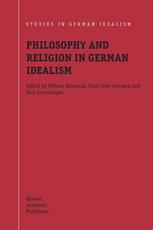

Most ebook files are in PDF format, so you can easily read them using various software such as Foxit Reader or directly on the Google Chrome browser.
Some ebook files are released by publishers in other formats such as .awz, .mobi, .epub, .fb2, etc. You may need to install specific software to read these formats on mobile/PC, such as Calibre.
Please read the tutorial at this link: https://ebookbell.com/faq
We offer FREE conversion to the popular formats you request; however, this may take some time. Therefore, right after payment, please email us, and we will try to provide the service as quickly as possible.
For some exceptional file formats or broken links (if any), please refrain from opening any disputes. Instead, email us first, and we will try to assist within a maximum of 6 hours.
EbookBell Team

4.3
58 reviewsThis book contains the selected proceedings of a conference on Religion in German Idealism which took place in Nij- gen (Netherlands) in January 2000. The conference was - ganized by the Centre of German Idealism, which co-or- nates the research on classical German philosophy in the Netherlands and in Belgium. Generous support of the Dutch Organisation for Scientific Research (NWO) has made this conference possible. A few months after the conference Ludwig died, and this circumstance unexpectedly delayed efforts to bring the proceedings of the conference to p- lished form. We are now happy to present those proce- ings, dedicated to the memory of the founding father of the Centre. It was a great joy to work with Ludwig; it was an even greater joy to be reckoned amongst his friends. It was part of Ludwig’s distinctive charisma that he was able to combine friendship together with collaboration in philo- phical and scholarly work. William Desmond Ernst-Otto Onnasch Paul Cruysberghs ix INTRODUCTION WILLIAM DESMOND, ERNST-OTTO ONNASCHand PAUL CRUYSBERGHS 1 The studies in this book testify to the intimate relation of philosophy and religion in German idealism, a relation not also devoid of tensions, and indeed conflicts. Idealism gave expression to a certain affirmation of the autonomy of p- losophical reason, but this autonomy was one that tried to take into account the importance of religion. Sometimes the results of this claim to autonomy moved towards criticism of religion.